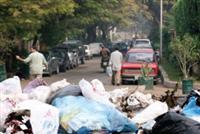



all photos by Ryan Luikens
above: street garbage; bottom head of Maadi Town Council "the hayy"
|
|
|
|
|
Cheers to our "talented" literature prize awardee. Your pain his gain !!!
|
|
|
EGY.COM - MAADI
|
|




all photos by Ryan Luikens
above: street garbage; bottom head of Maadi Town Council "the hayy"
By Azza Khattab for Egypt Today - the Magazine of Egypt
December 2008
Call me a snob, but humility has really never been my strong suit. After all, I was born in 1907 with a golden spoon planted firmly in my mouth. My parents, the successful British and Jewish businessmen who were the primary shareholders in the Delta Land and Investment Company, had every intention of creating a little bit of heaven here on earth: Me, Maadi.
If you will permit me to say so, I was a flawless child who grew into everything my parents dreamed of and more - a true delight for the senses. Indeed, I am proof that sparing the rod spoils the child, for I grew up with strict rules and regulations governing my development, building codes, hygiene and the safety of my streets. For many years, my picture-perfect life made other towns green with envy. Chirping birds woke up the residents. The clean, fresh air was always scented with jacaranda blossoms. Flowering shrubs nestled against rare and precious trees and flowers.
But as I now know, happy beginnings don't guarantee happy endings. The same trees that once stood as proud testimony to my joyful childhood are now dying proof that their beloved neighborhood couldn't escape the ill winds of change.
Were they to walk the Earth again today, my parents wouldn't recognize me. Indeed, I often fear I am indistinguishable from the piles of garbage that have mushroomed on nearly every corner of my streets. Yes, the nation's filth has officially infected me, with mounds of moldering garbage, streams of insects and vermin and the rotting corpses of small animals all topped off by the mass graves of hacked-apart trees.
God help me for saying this, but if you plot to kill someone, you should plan in advance where you're going to dump the body. You're a disgrace to your profession if you leave behind unfinished business - this was, at least, how it used to be done back in my day. Call me old fashioned, but it seems no one has the class or initiative to cover up their crimes these days. Just take a walk in my streets, and you'll see for yourself the aftermath of the Great Maadi Tree Massacre of 2008: The branches and stumps of chopped-down trees are still left on the ground, stark evidence against reckless officials who show no signs of respect or remorse for what they have done.
What prompted the massacre complaints, officials say, that my trees were not just a threat to human life and property, but that they also encouraged vice, providing shade and concealment for those who would fool around in public. But if they were threats to residents' safety, say my trusted friends at the Tree Lovers' Association, it was only because those entrusted with pruning neglected them for so long. In the meantime, I stand here pleading with the sleepwalkers to wake up and smell the trash -the rotting food, takeaway wrappers, cigarette butts, syringes and all the rest of it.
I have to admit I am not up on the latest technology used in the sanitation industry, but I am reasonably familiar with the bedraggled street-sweepers in their orange and green uniforms who -when not chasing locals for money or climbing into dumpsters to fish for empty water bottles - sit defeatedly next to their own little towers of garbage. Their accessories of choice: broomsticks that could be put to better use by witches than by these soulless apparitions. Once, these people worked. Today, they entertain me for hours on end as they robotically push garbage from one side of the curb to another, pieces of cardboard in hand as shovels, as they mime lifeless attempts to clean up. And that's on a good day: Too many of them toss trash out of dumpsters and onto the streets as they sift for one or two more valuable pieces to take with them.
Codependent relationships are complicated, after all. We love those who clean after us, but once they do a lousy job, leaving us to drown in trash, we would love to place a pox on their homes.
But talk to the cleaners and you'll hear they're not living in paradise, either. No amount of cleaning up, they say, will change the filthy behaviors of Maadi residents who toss trash from their car windows, who litter as they walk, who are equally happy to deposit medical waste and construction debris on my once-green midans.
“I'm not Superman,” says Abdel Razik, a Maadi cleaner employed by the wizards at Europa 2000. “The garbage never stops coming, and people are becoming filthier by the day. They don't care about their neighborhood, because if they did they wouldn't mind putting their trash out in a neat way, let alone maybe bending over once in a while to pick up litter. We keep cleaning up after them, but once we turn our backs, they throw their trash everywhere.
“The local district council (hayy), the construction workers, the bawabeen - they all dump their trash on the streets and expect it to magically disappear,” he says. “But you know what? It's the hayy's responsibility to cart away chopped-down trees. Yet they leave them where they are, and people come scream at us. We're outnumbered. You need a whole army of cleaners to deal with today's growing garbage.”
Fine, but isn't he paid to do an honest day's labor? “This isn't your typical dream job where people wait in lines to apply, especially when you're paid LE 200 a month,” Abdel Razik says. “It's better for your health and pocket to become a beggar.”
Carting away trash may be a job for Abdel Razik, but for a handful of community volunteers, it was a way to reclaim their neighborhood as their own. Last month, the Maadi Environment Rangers, along with other volunteer groups, local residents and schoolchildren, proved that actions speak louder than words, taking to the streets with gloves, brooms, bags and shovels to enforce some basic rules of public hygiene.
Their one-day clean-up campaign covered four areas: Saad Al-Aly Street and Roads 3, 4 and 5. Some 40 children from the local schools came to help them -and to embarrass those who have no shame - while my fair lady Yosria Sawiris provided the team with trucks to collect the bags of trash and send them off to the landfill.
I have to admit, clean-up day brought me a glimmer of hope -I even skipped my daily antidepressant as I spotted volunteers giving away garbage bags, chocolate and juice to the cleanup team while a media circus crowded nearby. And the media attention came with an added bonus: Miraculously, the authorities fixed the sewage problem that had been killing the street for weeks.
Above all, I was heartened to see the big fish in my pond, Gen. Ahmed Hany, the newly appointed head of the hayy, standing in the middle of the street. Posing in front of the cameras like a movie star, he pledged to spare no effort to give me the facelift I deserve. After all, he said, he has instructions to clean me up “from head to toe.”
Long live instructions
This wasn't the first time Maadi volunteers came face-to-face with Hany. My loyal supporters - including six NGOs crowned by the Tree Lovers' Association and the Maadi Rangers -had earlier hosted a public forum titled “The Suburb of Maadi: Where is it headed?” I knew where I was headed: For disaster. That much became clear when the general said that residents shouldn't take the garbage problem personally. After all, he said, it's become a national crisis.
Call me crazy, but if they're willing to say that about an upscale neighborhood like me, what's happening in the slums, shantytowns and marginalized communities?
In fact, the head of the Maadi hayy told his audience, “Maadi is paradise compared with Nasr City where I live.”
That's right, folks: The man who is essentially the mayor of Maadi isn't a resident. How's that for gifted political decision making?
My bent to discriminate on the basis of residential affiliation aside, I have to give Hany credit: He is one government official unafraid to point the finger of blame. My streets are choked with refuse, he said, because of the misdeeds of Europa 2000, the infamous private sanitation company working in concert with the Cairo Cleaning and Beautification Authority (CCBA).
As Hany put it: “I have no sanitation company at work right now.” (Note to Hany's colleagues in government: Can we please change the CCBA's oh-so-misleading name? Simply put, there is neither cleaning nor beautification going on. Not in Maadi, not in Nasr City, not anywhere.)
So the cleaners blame the residents, the residents blame the local authorities, the local authorities blame it on Europa 2000, which the CCBA contracted to clean Maadi. The privately owned Egyptian firm that is responsible for 'cleaning' our streets is not the first to fail the capital city. That dubious honor belongs to the high-tech foreign geniuses at Enser, which pulled out of its contract in 2006. (Am I the only one who imagined robots programmed to track down refuse and press the 'Terminate' button when I was first told foreign companies would apply “new technologies” to our garbage problem?)
I demanded Europa explain its failings, but the company shrugged my charges off, saying it takes two to tango. Hani Abdel Azeem, the company's supervisor in Maadi and, as such, the man on the receiving end of an enormous volume of complaints, hasn't been happy lately. Although he grudgingly expresses his disappointment and serious concerns about Maadi's miserable conditions, he reminds me that we can't put all the blame on his camp.
Europa 2000, you see, blames the government.
“It depresses me to see Maadi reaching a crisis stage. My company has gracefully executed its responsibilities for eight years, and we were proud that Maadi deservingly earned the title, 'Best Neighborhood' for more than five years. The problem is that in the last few months, we had a dispute with the hayy and the new governor of Helwan, to which Maadi now belongs. Unfortunately, this dispute has affected our performance,” Abdel Azeem says.
How so? “Our contract stipulates that we work one shift from eight in the morning until four in the afternoon, using 12 trucks,” he explains. “But the fact is that we had been working - and had been paid for -three shifts, since it's not possible to clean up the whole suburb in just eight hours. We were disappointed when the governor of Helwan decided to cancel the two additional shifts and informed us that he won't pay for more than one. Since the owner of our company isn't willing to spend money from his own pocket to clean up Maadi, he was forced to cut back services.
“We're deploying a full-time force of sweepers and 12 trucks to serve the neighborhood, but it's simply not sufficient. Still, we hope the days to come will carry solutions to this problem through proper and fair negotiations.”
Ezzat Abdel Hameed, the general manager of CCBA in Maadi, smiles as he calls the current problem “a family dispute” of the type newlyweds so often suffer. Like Abdel Azeem, he says the problem began when the sanitation company was forced into a new marriage with the governorate of Helwan, which the government saw fit to create in April 2008. That decision arbitrarily - and without consulting me or my loyal subjects - declared a huge swath of what was once Cairo to now be in Helwan.
Abdel Hameed explains that the company is contracted to cover waste from 28,000 residential units in a single shift. The governorate of Helwan has issued an order stating that the contract must cover 74,000 units. “The company pleaded for more shifts and more money,” he told me, “but the new governorate declined since it's still sorting and allocating its resources.”
Unhappy with the decision, Europa 2000 is applying pressure by sticking doggedly to one shift -and being somewhat slack even in that, alleges Abdel Hameed.
“Frankly, the morning shift doesn't really help, since people mostly throw out their trash at night,” the CCBA's Maadi boss tells me.
“Naturally, the company failed to get its job done properly, so the governorate started fining them. The fines got larger, and the company got angrier and more stubborn, forcing the head of the hayy to hire a contractor to clean up. Rumors spread that the company trucks are purposefully leaving behind and even dumping trash to exert pressure on the hayy.
“Nobody wants things to get that ugly: The owner of the company himself announced he's ready to clean up Maadi in one day. I assure you, in no time, problems will disappear and they will kiss and make up and everyone will be happy.”
Abdel Hameed's words are at odds with those of Hany, the head of the hay, who declares during the forum that the days of negotiations are nearly over.
“From day one, I tracked down several violations which were documented and filed,” the general says. “The governor sent the company an official ultimatum - in an attempt to terminate the contract. However, I want people to be patient, for I can't hire a new company until I get rid of the existing one; otherwise, they will sue me and plead for millions in compensation. Once we kick them out, we will issue a call for tenders for a new sanitation contractor.”
The problem is that in this case, none of us can afford for the wheels of justice to slowly grind on: Public health is at stake, with abandoned garbage happily inviting rats, flies, mosquitoes, cockroaches, mice, small animals (dead and alive), all of which can spread infectious diseases.
You might think that the problem had progressed far enough to be declared an environmental concern, but you would be wrong. Maadi may be home to the Egyptian Environmental Affairs Authority, but the good folks there aren't leaving their offices other than to offer flyers and inadequate supplies to the residents' clean-up campaign. Perhaps they're hiding from the “black smoke” that descends upon us all each fall?
As we head into winter, I don't want a last-minute rescue from the authorities. I don't want a rushed, one-day cleanup in which the sanitation company or the hayy deploy their army of super-cleaners to prove their prowess and compensate for months of apathy, negligence and filth. I want a serious, well-thought-out plan on how to keep my clean record intact.
Many urban planners and concerned residents say the solution is for me to be declared a man-made protectorate, saying that garbage and the other ills plaguing me are only the latest in a string of disasters that are slowly erasing my identity. Dr. Ahmed El-Guindy, Asmaa El-Helwagy and Samia Zeitoun, the champions of the Tree Lovers' Association, fear that it's all downhill from here.
“The garbage problem is the symptom, not the disease,” says El-Guindy, noting that villas are being replaced by tall, ugly concrete monstrosities despite a military decree ordering the villas be left untouched. The pressure on the district's infrastructure mounts daily, and my place in the new, cash-strapped governorate of Helwan is the straw that broke the camel's back.
Like it or not, I'm now officially known as the city of Maadi, and I have been forced to claim Tora as my (illegitimate) child. Officials say that the decision to turn a suburb into a city was in response to the pleas of the local people's council, but NGOs and even some local council members, like my dear friend Fatma El-Nabrawy, not only deny that claim - they're also alleging that the decision was unconstitutional.
Citizens, they say, have a right to be consulted “on major issues concerning the agendas, planning and policies of their polity.” They call it “their lawful right to predict change.” But with our government, you can only predict the unpredictable. That said, I think we can all agree that it doesn't take a genius to realize that the 16 embassies that call Maadi home are required to be based in Cairo, the capital. The same thing applies to the Supreme Constitutional Court, which would have been legally required to move back into Cairo after the decision to redistrict me into Helwan.
A presidential decree has since redrawn the geographic borders of Maadi to stop just before the court. Whether anyone will do the same for the embassies is an open question.
The Prime Minister and the Minister of Housing admit to have been bombarded with petitions to keep me in the barn that is Cairo, but nothing is happening. In fact, they're now discussing the future administrative and organizational skeleton of Helwan's four new cities - me included.
My champions don't want to admit they are tilting at windmills, telling anyone who will listen that Maadi just doesn't fit in with Maasara and Tora. After all, they say, dear Maadi's leafy streets and green areas don't exactly match well with the chimneys of cement factories and polluted effluent.
For the moment, though, the Helwan-Cairo debate is the least of my worries. I'm more concerned about living gracefully - and healthily - into my old age. The truth is that I'm not getting any younger, and for a one-hundred year-old, looks count, and personal hygiene is a basic necessity. Remember Dr. Abraham Maslow and his hierarchy of basic needs, which holds that your most basic physical needs must be satisfied before you aspire for higher ones? It can't be that after all these years of glory, you drag me into such a stinky position.
For the time being, I spend my days contrasting today's disappointments with tomorrow's possibilities. Every night, I mutter wishful prayers under my breath - if only the First Lady lived or had an office in Maadi And as I close my eyes and lay my head down to sleep, I take heart that my people still believe in me. They fight for my life, for the old Maadi they and their families grew up in. They still see traces of beauty and charm amid the growing piles of trash, the traffic and the pollution. Yes, right there in my ancient trees, my old villas, my undeniable character and, whether you like it or not, my self-proclaimed status as the fairest of the capital city's neighborhoods.
|
|
|
|